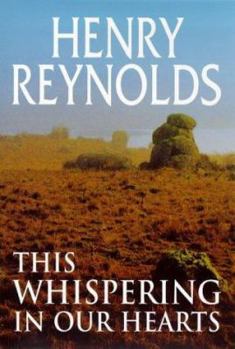This Whispering in Our Hearts
Select Format
Select Condition 
Book Overview
A different history of Australia through the eyes of remarkable and largely forgotten people This description may be from another edition of this product.
Format:Paperback
Language:English
ISBN:1864485817
ISBN13:9781864485813
Release Date:September 1998
Publisher:Allen & Unwin Australia
Length:284 Pages
Weight:0.70 lbs.
Dimensions:0.8" x 5.2" x 7.7"
Customer Reviews
2 ratings
How do you oppress non-existent people?
Published by Thriftbooks.com User , 22 years ago
History has yet to produce a full account of the British Empire. One of the reasons for this shortfall is the lack of voices of the invaded. Nowhere in the former British Empire is the silence more deafening than Australia. Touched by Europeans for over a century before the Port Jackson convict settlement was founded, Australia was the most enigmatic outpost of Empire. Although the first Governor was enjoined to deal with the scattered Aborigines fairly, it wasn't long before the true Australians were driven from their lands, murdered or made into domestic servants. Henry Reynolds, noted historian of the Australian scene, richly chronicles the attempts by white humanitarians to give these displaced people some level of resistant voice.Reynolds chooses one issue, occupation of the land, as his major theme. There are, he admits, many other issues that might have been considered, but the land question remained fundamental to European-Aborigine relations. Australia was the sole colony of the Empire declared "terra nullius" - unoccupied by human beings, therefore open to unrestricted invasion. The island continent and all its resources were at the disposal of the Crown.Australia, of course, had occupants when the First Fleet sailed into Botany Bay, and it wasn't long before they began resisting invasion. Reynolds shows that the Aborigines had allies among the white invaders, people who urged at the very least, that the "natives" be offered remuneration or protected reserves on which to live. He reviews the careers of these humanitarians with sympathy and applause, but recognizes the futility of their efforts. Not a few failed simply because their personalities were unsuited to the task of inhibiting the rape of the continent. Resistance to white oppression of the Aborigines began as early as the first penal settlement. William Dawes objected to the first of a multitude of punitive expeditions launched to revenge the spearing of a servant. Reynolds notes these "expeditions," which continued into the 20th Century, followed a consistent pattern - unselective killing in revenge for Aborigine defense of their homeland. From Dawes, Reynolds traces the course of objections to wanton slaughter of Aborigines through the notable figures trying to stem the flood of settlement and its attendant conflict. He cites George Augustus Robinson's work to isolate Aborigines in Victoria and Tasmania from white settlement - a career which ended disastrously. Reformers in Western Australia were driven into exile by irate settlers, and Queensland earned its unsavoury reputation with the creation of the Native Police, an unrestrained paramilitary force. Reynolds intersperses his own text with supportive sources of personal journals, letters, government documents and newspaper articles. The result is a descriptive potpourri of opinions, accounts, policy making and, most important, a struggle for justice.
A moving account of early Australian humanitarians
Published by Thriftbooks.com User , 25 years ago
This book, by the celebrated historian Henry Reynolds, describes the efforts of some of the early settlers in Australia in support of the Aborigines.At times, the book is profoundly moving. It recounts appalling atrocities committed against Australia's indigenous communities by the "civilized" British.Its main focus, though, is the efforts of a number of people who tried to ensure that the Aborigines were treated fairly and with compassion. It provides an insight into their struggles in aid of the Aborigines, their perseverance in the face of rejection and the hardships they often suffered.Despite being a history book, the text is quite readable!In summary, this is a moving and enlightening book about some of Australia's "forgotten" humanitarians.






